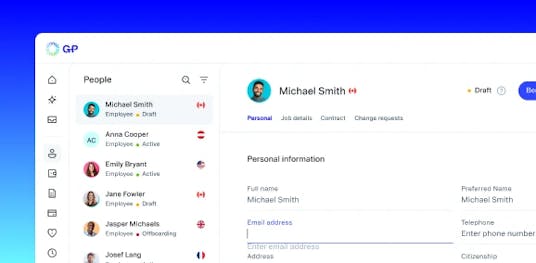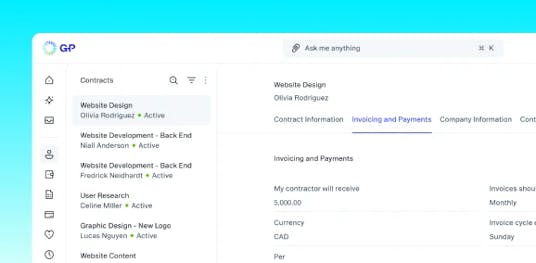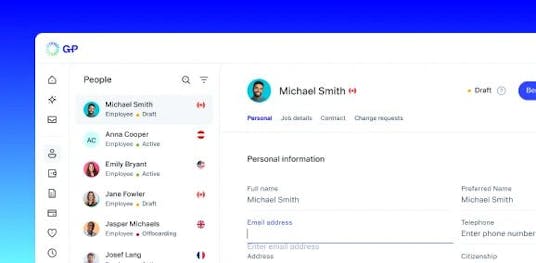Expanding your business to Malta offers access to a skilled and multilingual workforce in a strategic European location. The growing workforce is a cornerstone for global businesses seeking international reach. However, navigating Maltese employment law to hire talent and manage global payroll requires significant local expertise. Handling both employment and tax regulations is vital. Establishing a local subsidiary can be a lengthy and costly process, creating a barrier to rapid growth. This is where a Malta Employer of Record can transform the process.
G-P’s employer of record (EOR) solution provides a streamlined pathway to hiring a team in Malta, ensuring compliance with labor laws. We allow you to hire employees and manage payroll compliantly without the need to set up a local branch office or subsidiary. Your chosen candidate is hired through our compliant local entity and onboarded in days, not months, minimizing the onboarding time. They become a productive member of your team, dedicated to your company’s goals, while we handle the complexities of HR, payroll, and compliance on your behalf.
Hiring in Malta
Malta is an island nation in the Mediterranean Sea with a population of over 540,000. As a member of the European Union, it is one of the world's smallest and most densely populated countries. Its capital city is Valletta, and the official languages are Maltese and English, which simplifies international business operations. When preparing to hire in Malta, it is essential to understand the local labor regulations that govern employment relationships. This includes understanding employee rights concerning work hours, overtime, and leave entitlements.
Employment contracts in Malta
While an employment agreement can be verbal, Maltese law requires employers to provide employees with a written statement of key employment conditions within 8 working days of their start date. It is a strong best practice to have a comprehensive, written employment contract in place from day one.
Contracts can be for an indefinite period or a fixed term. A series of fixed-term contracts is generally limited to a cumulative maximum of 4 years, after which the employment is typically considered indefinite. All offer letters and contracts must state salary and compensation amounts in euros (EUR).
As your EOR in Malta, G-P ensures all employment contracts are compliant with local laws, drafted in the appropriate language, and include all mandatory terms covering compensation, benefits, and termination protocols.
Working hours and probation in Malta
A standard workweek in Malta is 40 hours. The statutory probation period is 6 months. This can be extended to 12 months for employees in management or executive positions, or for roles with salaries exceeding double the national minimum wage, provided this is agreed upon in the employment contract.
During probation, if employment has lasted longer than 1 month, a 1-week notice period is required for termination.
Statutory benefits and leave in Malta
Managing statutory benefits is a core function of an EOR. In Malta, key entitlements include: public holidays, paid leave, and benefits, all maintained to comply with statutory laws.
Malta public holidays
Malta celebrates 14 national and public holidays. A unique provision in Maltese law states that when a public holiday falls on a Saturday or Sunday (a non-working day for most), employees are entitled to an additional day of vacation leave in that calendar year.
-
New Year's Day (January 1)
-
Feast of Saint Paul's Shipwreck (February 10)
-
Feast of Saint Joseph (March 19)
-
Freedom Day (March 31)
-
Good Friday (date varies)
-
Labour Day (May 1)
-
Sette Giugno (June 7)
-
Feast of Saints Peter and Paul (June 29)
-
Feast of the Assumption (August 15)
-
Feast of Our Lady of Victories (September 8)
-
Independence Day (September 21)
-
Feast of the Immaculate Conception (December 8)
-
Republic Day (December 13)
-
Christmas Day (December 25)
Malta annual leave (Vacation)
Full-time employees are entitled to a minimum of 192 hours of paid annual leave, which equates to 24 working days for a 40-hour workweek. This is in addition to the extra leave days granted for public holidays that fall on weekends. With employer agreement, employees can carry over up to 50% of their annual leave entitlement to the following year.
Malta sick leave
Employees in Malta are entitled to paid sick leave, funded initially by the employer. The statutory minimum amount of sick leave varies depending on the relevant Wage Regulation Order for the specific industry sector.
Malta parental leave
Malta provides statutory maternity, paternity, and parental leave, ensuring employees have job-protected time off for family responsibilities. These leaves are governed by specific eligibility criteria and payment structures, which G-P manages for all employees on our platform.
Taxes and payroll in Malta
Employers and employees in Malta must contribute to the national social security system, which funds pensions, sickness benefits, and other social programs. Income tax is progressive, with rates depending on the employee's income level and filing status. As your EOR, G-P manages all Malta payroll functions, including calculating and withholding the correct amounts for taxes and social security and ensuring timely payments to the authorities.
Termination and severance in Malta
Terminating an employment contract after the probationary period requires a just cause and adherence to statutory notice periods, which increase based on the employee's length of service. Failure to follow proper procedures can lead to claims of unfair dismissal. G-P helps manage all termination and severance processes in compliance with Maltese labor law, mitigating risks for your company.
Why choose G-P as your employer of record in Malta?
G-P EOR is the award-winning, AI-powered SaaS platform that empowers ambitious companies to build global teams. Onboard, manage, and pay top talent in over 180 countries in minutes, bypassing the typical time, cost, and complexity of local entity setup. G-P EOR is the preferred partner for leading HCM, PEO, and payroll platforms. Bring your workforce data together in one place to maintain existing workflows while guaranteeing consistent and accurate data across your integrated systems.
Request a proposal today to learn more.




















